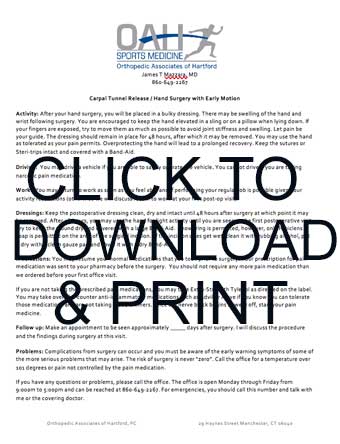Activity: After your hand or wrist surgery, you will be placed in a bulky dressing and splint. There may be swelling of the hand and wrist following surgery. You are encouraged to keep the hand elevated in a sling or on a pillow when lying down. If your fingers are exposed, try to move them as much as possible to avoid joint stiffness and swelling. Let pain be your guide.
The dressing should remain in place until you are seen in the office. You may move the fingers if they are exposed in the splint. Otherwise, do not over use the hand as this may displace the fracture repair.
Driving: You may drive a vehicle if you are able to safely operate the vehicle. You cannot drive if you are taking narcotic pain medication. You may not drive if you cannot safely drive with your hand and wrist is a splint.
Work: You may return to work as soon as you feel able and if performing your regular job is possible given your activity restrictions (otherwise we will discuss return to work at your first post-op visit).
Dressings: Keep the postoperative dressing clean, dry and intact until seen in the office. Get a cast cover from the pharmacy or surgical supply to keep the splint dry during showers. A wet splint will increase the chances of infection.
Medications: You may resume your normal medications that you took prior to surgery. Your prescription for pain medication was sent to your pharmacy before the surgery. You should not require any more pain medication than we ordered before your first office visit.
If you are not taking the prescribed pain medications, you may take Extra-Strength Tylenol as directed on the label. You may take over-the-counter anti-inflammatory medications such as Advil or Aleve if you know you can tolerate those medications and are not taking blood thinners. Once the nerve block begins to wear off, start your pain medicine.
Follow up: Make an appointment to be seen approximately _____ days after surgery.
I will discuss the procedure and the findings during surgery at this visit.
Problems: Complications from surgery can occur and you must be aware of the early warning symptoms of some of the more serious problems that may arise. The risk of surgery is never “zero”. Call the office for a temperature over 101 degrees or pain not controlled by the pain medication.
If you have any questions or problems, please call the office. The office is open Monday through Friday from 9:00am to 5:00pm and can be reached at 860-649-2267. For emergencies, you should call this number and talk with me or the covering doctor.
